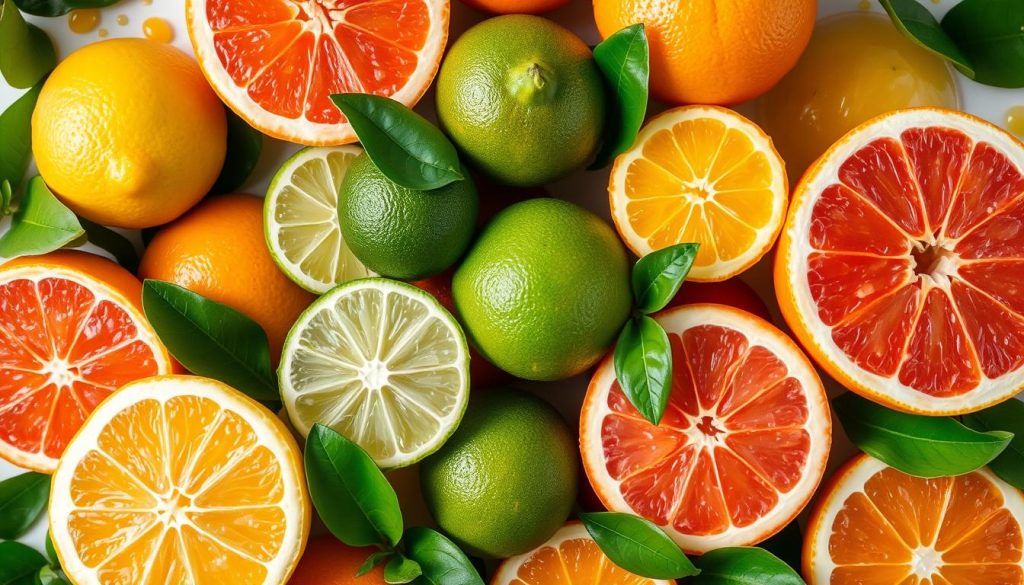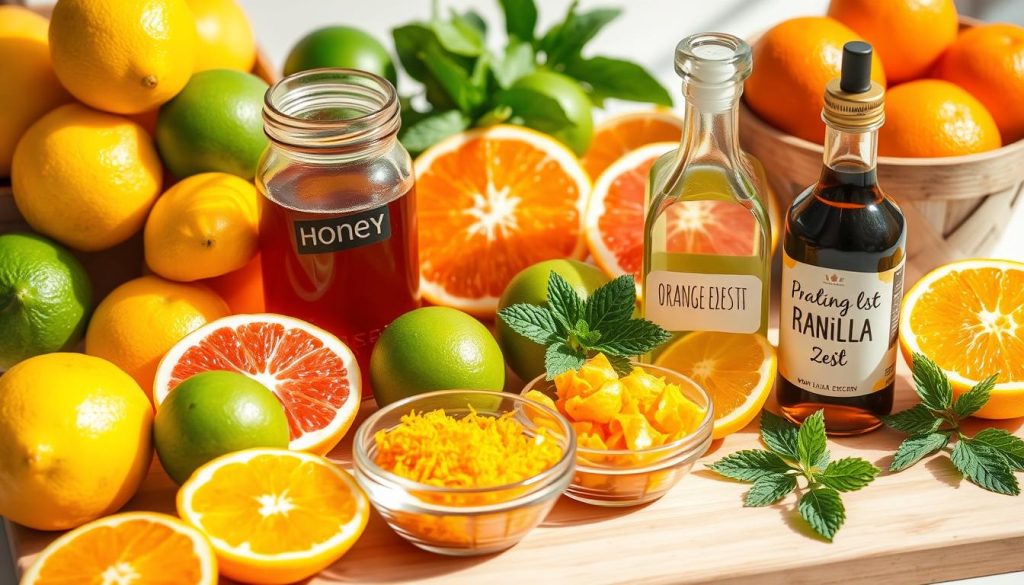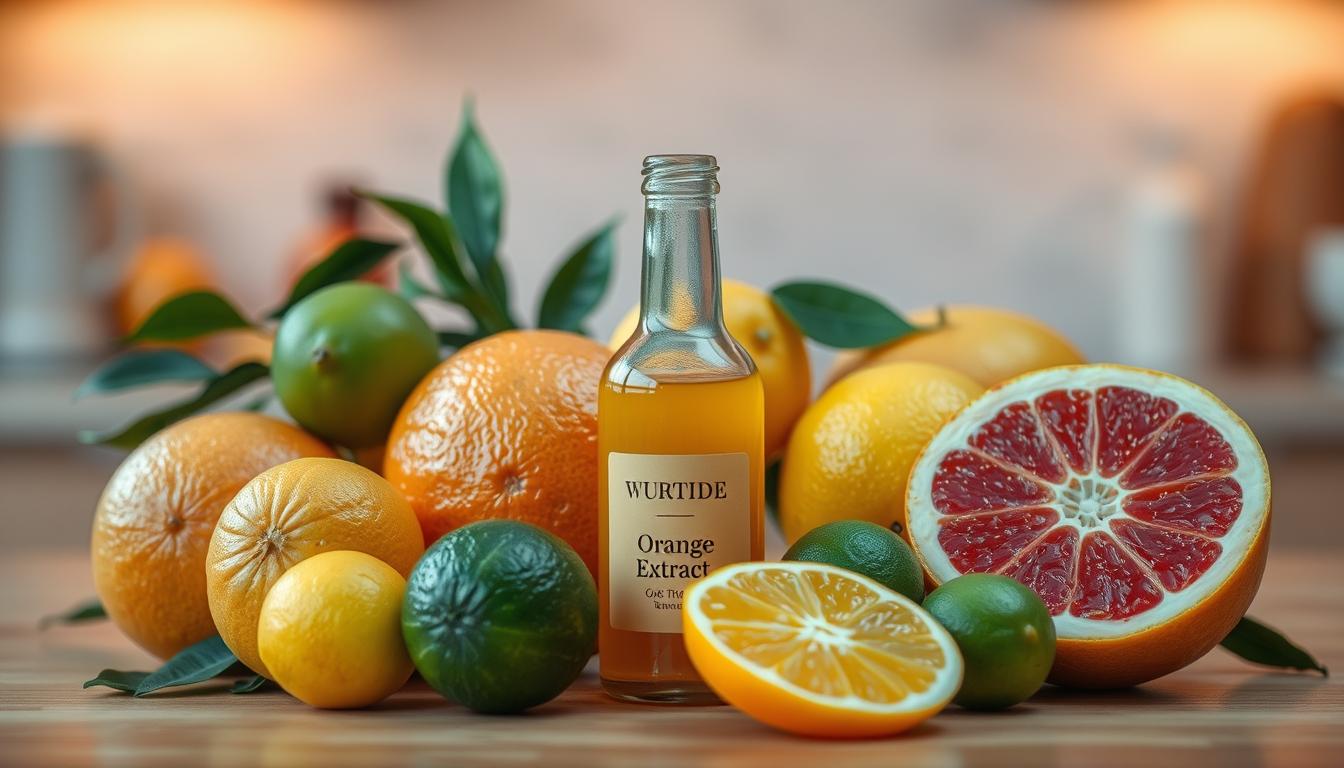Need a substitute for orange extract? You’re in the right place. Orange extract is made from orange oils and adds a bright citrus taste to food. It’s a favorite in many kitchens. But sometimes, it can be hard to find.
Don’t worry, there are many alternatives to orange extract. They can give your dishes a similar citrus flavor. This guide will show you how to use these substitutes in your cooking and baking.
Understanding Orange Extract
Orange extract is a key ingredient in many recipes. Knowing its orange extract composition can make cooking better. It’s mostly orange oil, with a bit of alcohol like vodka, giving it a strong taste.
Chefs and bakers like it because it’s made by cold pressing or steam distillation. This method captures the bright flavor of oranges.
Composition and Properties
The properties of orange extract make it useful in the kitchen. Making it at home involves mixing 1 cup of vodka with 1 orange peel. It takes about six weeks to develop the flavor.
Keep it in a sealed container to keep it fresh for months. But, alcohol-based extracts are best used within 1-2 years. Homemade orange extract has about 18 calories per teaspoon, making it a tasty, low-calorie choice.
| Aspect | Details |
|---|---|
| Preparation Time | Approximately six weeks |
| Ingredient Ratio | 1 cup of vodka to 1 orange peel |
| Shelf Life | Months if stored properly |
| Quantity Suggestion | 1 teaspoon in most recipes |
| Nutritional Information | 18 calories per teaspoon |
Culinary Uses
The culinary uses of orange extract are many. It can replace orange zest and juice in dishes like ice creams, popsicles, and cakes. It adds flavor without adding too much moisture.
Remember, a little goes a long way. It’s best to use it sparingly to enhance your recipes.
Why Use Substitutes for Orange Extract?
There are many reasons to use substitutes for orange extract. Sometimes, you might not have it in your pantry. But, there are other options that can add unique flavors to your dishes. If you can’t have alcohol, finding substitutes is especially important to keep the citrus taste.
Accessibility and Flavor Profile
Accessibility is a big reason for using substitutes. If you don’t have orange extract, orange zest or juice can give a similar taste. Orange marmalade, for example, combines zest and juice for a deeper flavor. Knowing about these different flavors lets you get creative and still make tasty dishes.
Adjusting to Dietary Needs
Dietary needs can also guide your choice of substitutes. If you can’t have alcohol, options like orange juice concentrate or essential oils are good. They keep the flavor without the alcohol. This way, you can make dishes that everyone can enjoy.
| Substitute | Quantity | Flavor Notes |
|---|---|---|
| Orange Zest | 1:1 ratio | Bright, fresh citrus |
| Orange Juice | 2 teaspoons | Juicy, sweet flavor |
| Orange Marmalade | 1:1 ratio | Complex sweetness with zest |
| Orange Oil | 1/2 teaspoon | Intensely concentrated citrus |
| Mandarin Puree | 1:1 ratio | Sweet and fragrant |
Common Substitutes for Orange Extract
Need a substitute for orange extract? You have several options. Each one has its own taste and strength. It’s important to pick the right one for your recipe.
Orange Zest
Orange zest is a great choice. It has oils that give a strong citrus taste. Use the same amount as orange extract. It’s perfect for baked goods, dressings, and sauces.
Orange Juice
Need a liquid substitute? Orange juice is a good option. Use twice as much juice as extract. For example, use two tablespoons of juice for one tablespoon of extract. For bigger amounts, mix 1/4 cup of concentrated juice with 3/4 cup of water.
Orange Marmalade
Orange marmalade adds sweetness and a bit of bitterness. It’s great for desserts and glazes. Use half a tablespoon of marmalade for each tablespoon of extract. It makes your dishes thicker and sweeter.
Orange Oil
Orange oil gives a strong citrus flavor. It’s very concentrated, so just a few drops are needed. It’s perfect for baking, candy-making, or adding flavor to dishes.
Citrus-Based Substitutes
Citrus-based alternatives can add exciting flavors to your cooking. They offer vibrant tastes that are similar to orange extract but come from different fruits. This means you can try many options to find the perfect flavor for your dishes.
Other Citrus Extracts
Looking for something other than orange extract? Try lime, grapefruit, or bergamot extracts. Lime adds a sharp acidity, while grapefruit brings a sweet and slightly bitter taste. Bergamot, with its floral scent, works well in both sweet and savory dishes.
Citrus Liqueurs
Substitutes like Grand Marnier or Cointreau add deep citrus flavors and a touch of alcohol. They’re great for desserts and cocktails, but use them sparingly in baking. Remember, these liqueurs change the taste and alcohol level of your recipes.

| Substitute | Flavor Profile | Best Uses |
|---|---|---|
| Lime Extract | Bright and tangy | Cocktails, dressings, desserts |
| Grapefruit Extract | Slightly sweet and bitter | Salads, marinades, baked goods |
| Bergamot Extract | Floral and aromatic | Tea, desserts, savory dishes |
| Grand Marnier | Rich and complex | Brownies, cocktails, sauces |
| Cointreau | Crisp and sweet | Cocktails, sweet dishes, glazes |
Alcohol-Based Alternatives
Alcohol-based alternatives to orange extract can make your dishes taste better. Using liqueurs in baking can really boost your cooking. Grand Marnier and Cointreau are great because they have a strong orange flavor. They add depth without overpowering your dish.
Using Liqueurs
When substituting orange extract, use half a teaspoon of liqueur for every teaspoon of extract. This keeps your recipe balanced and adds a unique touch.
Other Alcohol Alternatives
If you don’t like liqueurs, try infusing vodka with orange zest. It captures the citrus taste well. Rum extract is another choice, with a sweeter taste that’s perfect for some baked goods.
Remember, use alcohol substitutes in moderation. The right mix of flavors keeps your dishes tasty and fun to eat.
| Substitute Type | Amount for 1 tsp Orange Extract | Flavor Notes |
|---|---|---|
| Grand Marnier | 1/2 tsp | Sweet, orange flavor |
| Cointreau | 1/2 tsp | Citrusy, balance of sweet and bitter |
| Citrus-infused Vodka | 1 tsp | Fresh, zesty undertones |
| Rum Extract | 1 tsp | Rich, sweet flavor |
Non-Alcoholic Substitute Options
Looking for non-alcoholic substitutes for orange extract? There are many tasty alternatives. Juice and essential oils are great options for different recipes. They’re perfect for those who follow special diets, making them a hit in the kitchen.
Juice Concentrates
Juice concentrates are a versatile choice for baking. Using 2 tablespoons of orange juice or concentrate can add a lot of flavor. This method is easy to use, as it matches the flavor of orange extract well.
It’s flexible for many recipes. This makes juice concentrates a top pick for cooking.
Essential Oils and Extracts
Essential oils, like orange essential oil, offer a strong flavor. Just a few drops can replace a teaspoon of orange extract. But remember, these oils are very concentrated, so a little is enough.
They’re great for adding flavor without alcohol. This makes them a fun and creative choice for cooking.

| Substitute | Recommended Ratio | Notes |
|---|---|---|
| Orange Juice Concentrate | 2 tablespoons | Use in place of 1/2 teaspoon of orange extract |
| Fresh Orange Juice | 2 tablespoons | Alternative for various recipes requiring orange flavor |
| Orange Essential Oil | 1-2 drops | Potent flavor; use sparingly |
| Homemade Glycerite | 1 teaspoon | Requires a minimum of two months to develop |
| Vanilla Extract (as a backup) | 1 teaspoon | Can complement orange flavors in baked goods |
Creative Ways to Use Substitute for Orange Extract Guide
Using substitutes can change your cooking into a fun adventure. It keeps the essence of orange extract alive. This part talks about how to make your recipes better with different substitutes. You’ll learn how to add new flavors to your dishes.
Adapting Recipes
Adapting recipes helps keep your dishes moist and flavorful. For example, use one teaspoon of orange zest for every tablespoon of substitute. This way, you get the right flavor without too much.
Here are some tips for adapting recipes:
- Start with small amounts of substitutes and add more if you like.
- Check if the substitute adds too much moisture. Balance it with other ingredients.
- Try using rose water or vanilla extract. Adjust the amount to get the flavor you want.
Enhancing Flavor Profiles
Using substitutes can make your recipes unique. Orange liqueurs like Cointreau or Grand Marnier can make cocktails better. Start with half the amount of orange blossom water your recipe calls for.
Substitutes like honey can add sweetness to savory dishes. Mixing different flavors lets you be creative in the kitchen.
Cherry extract or orange bitters can give your drinks a special touch. Each substitute adds something unique. So, feel free to experiment with what you have.
Here’s a table that shows substitutes for orange extract and their uses:
| Substitute | Ratio | Best For |
|---|---|---|
| Orange Zest | 1 tsp for 1 tbsp of extract | Baking, Sauces |
| Orange Juice | 1:1 substitution | Savory Dishes |
| Honey | Varies to taste | Salad Dressings |
| Rose Water | 1:1 substitution | Drinks, Desserts |
| Orange Liqueur | 1/2 the amount called for | Cocktails |
By trying these recipe adaptation techniques, you start a culinary journey. Each change you make makes your dish better and keeps the spirit of orange extract alive. You’ll create meals that amaze your taste buds.
Conclusion
When it comes to orange extract substitutes, you have many options. Fresh orange zest, juice, and even liqueurs can add vibrant citrus flavors to your dishes. This guide helps you find alternatives that fit your needs, ensuring your food stays tasty.
Exploring these substitutes can make your cooking more exciting. You can mix orange zest, juice, and concentrates to boost your recipes. For example, try them in an orange bundt cake. This way, you keep citrus flavors at the heart of your cooking, making every meal special.
Also, new methods like steam explosion extraction are changing how we get citrus oils. They’re more efficient and produce better results. Whether you’re a pro chef or a home cook, knowing about these methods lets you make better choices. It also encourages you to be creative in the kitchen, keeping citrus flavors alive in your cooking.
Source Links
- https://www.bhg.com/recipes/how-to/cook-with-fruits-and-vegetables/zest-substitute/
- https://www.spatuladesserts.com/orange-zest-substitute/
- https://www.myfrugalhome.com/how-to-make-orange-extract/
- https://www.simplystacie.net/homemade-orange-extract/
- https://thecoconutmama.com/how-to-make-orange-extract/
- https://discover.texasrealfood.com/swap-and-savor/orange-extract-substitutes
- https://caroha.com/orange-extract-substitutes/
- https://www.tidbits-cami.com/orange-extract/
- https://www.cleaneatingkitchen.com/substitutes-for-orange-juice/
- https://www.alsothecrumbsplease.com/substitute-for-orange-juice/
- https://simplybeyondherbs.com/how-to-make-orange-extract/
- https://foodcrumbles.com/orange-and-lemon-zest-extract-alcohol-extraction/
- https://thegreencreator.com/orange-juice-substitutes/
- https://www.milkglasshome.com/how-to-make-orange-extract/
- https://thekitchencommunity.org/orange-extract-substitutes/
- https://www.thespruceeats.com/alcohol-substitutes-1388864
- https://frugalhausfrau.com/ingredients/alcoholwine-substitutes/non-alcoholic-substitutes/
- https://www.thespruceeats.com/how-to-make-non-alcoholic-extracts-1388885
- https://www.seriouseats.com/diy-orange-liqueur-homemade-triple-sec-curacao-for-cocktails-recipe
- https://www.alsothecrumbsplease.com/top-orange-blossom-water-substitute-ideas-for-your-recipes/
- https://pmc.ncbi.nlm.nih.gov/articles/PMC6222077/
- https://www.dvo.com/newsletter/monthly/2018/october/tabletalk1.html
